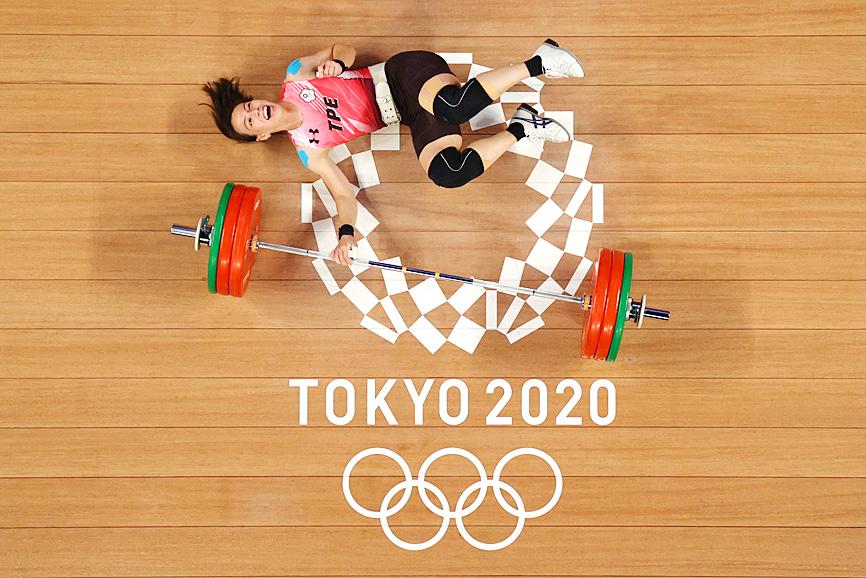Taiwanese Olympic gold medalist Kuo Hsing-chun (郭婞淳) on Saturday won her fifth world title at the International Weightlifting Federation (IWF) World Championships in Tashkent, Uzbekistan, clinching two gold medals and one silver.
Kuo, who competed in the women’s under-59kg division, won a silver medal in the snatch event after lifting 100kg, and then two gold medals with a clean and jerk of 130kg and a combined lift of 230kg.
Kuo also won the IWF World Championship title in 2019, 2018, 2017 and 2013.

Photo: Reuters
Her latest win was her 12th consecutive victory in the under-59kg and under-58kg categories, leaving her unbeaten since she finished third at the 2016 Olympic Games in Rio de Janeiro.
The competition consists of two parts: the snatch, in which an athlete lifts the bar from the floor to above their head in one movement, and the clean and jerk, which requires the athlete to first bring the bar to their chest before jerking it over their head.
Athletes compete by performing each of the two types of lifts three times and adding together the heaviest weight lifted in each. The person who scores the highest combined weight wins the competition.
On Saturday, Kuo lifted 97kg in her first attempt in the snatch, which was heavier than any of the attempts of her opponents.
She settled for a best of 100kg made in her second attempt after an unsuccessful third attempt.
Mariia Hanhur of Ukraine won the gold after lifting 101kg in her third attempt.
By the time Kuo successfully lifted 128kg in her second attempt in the clean and jerk, she had effectively won the title, as her combined lift outweighed that of her opponents.
In her third attempt, Kuo lifted 130kg to extend her combined lift to 230kg, beating Colombian Yenny Alvarez by 4kg, to take two golds.
All three world records in the women’s under-59kg class are held by Kuo. They are a 110kg snatch, a 140kg clean and jerk and a 247kg total.
Kuo has won 10 golds, five silvers and two bronzes at the World Championships. The number of gold medals she has also surpasses the nine accumulated by former Olympic national weightlifter Chen Jui-lien (陳瑞蓮), making Kuo Taiwan’s top weightlifter.
Considered a national sports hero, Kuo has had a remarkable year, setting two world records at the Asian Championships in April.
She carried Taiwan’s flag during the Tokyo Olympics opening ceremony, where she claimed her first Olympic gold medal.

The Ministry of Foreign Affairs (MOFA) yesterday said it is closely monitoring developments in Venezuela, and would continue to cooperate with democratic allies and work together for regional and global security, stability, and prosperity. The remarks came after the US on Saturday launched a series of airstrikes in Venezuela and kidnapped Venezuelan President Nicolas Maduro, who was later flown to New York along with his wife. The pair face US charges related to drug trafficking and alleged cooperation with gangs designated as terrorist organizations. Maduro has denied the allegations. The ministry said that it is closely monitoring the political and economic situation

Conflict with Taiwan could leave China with “massive economic disruption, catastrophic military losses, significant social unrest, and devastating sanctions,” a US think tank said in a report released on Monday. The German Marshall Fund released a report titled If China Attacks Taiwan: The Consequences for China of “Minor Conflict” and “Major War” Scenarios. The report details the “massive” economic, military, social and international costs to China in the event of a minor conflict or major war with Taiwan, estimating that the Chinese People’s Liberation Army (PLA) could sustain losses of more than half of its active-duty ground forces, including 100,000 troops. Understanding Chinese

UNRELENTING: China attempted cyberattacks on Taiwan’s critical infrastructure 2.63 million times per day last year, up from 1.23 million in 2023, the NSB said China’s cyberarmy has long engaged in cyberattacks against Taiwan’s critical infrastructure, employing diverse and evolving tactics, the National Security Bureau (NSB) said yesterday, adding that cyberattacks on critical energy infrastructure last year increased 10-fold compared with the previous year. The NSB yesterday released a report titled Analysis on China’s Cyber Threats to Taiwan’s Critical Infrastructure in 2025, outlining the number of cyberattacks, major tactics and hacker groups. Taiwan’s national intelligence community identified a large number of cybersecurity incidents last year, the bureau said in a statement. China’s cyberarmy last year launched an average of 2.63 million intrusion attempts per day targeting Taiwan’s critical

‘SLICING METHOD’: In the event of a blockade, the China Coast Guard would intercept Taiwanese ships while its navy would seek to deter foreign intervention China’s military drills around Taiwan this week signaled potential strategies to cut the nation off from energy supplies and foreign military assistance, a US think tank report said. The Chinese People’s Liberation Army (PLA) conducted what it called “Justice Mission 2025” exercises from Monday to Tuesday in five maritime zones and airspace around Taiwan, calling them a warning to “Taiwanese independence” forces. In a report released on Wednesday, the Institute for the Study of War said the exercises effectively simulated blocking shipping routes to major port cities, including Kaohsiung, Keelung and Hualien. Taiwan would be highly vulnerable under such a blockade, because it